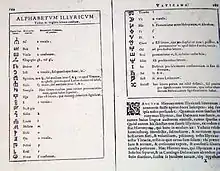Angelo Rocca
Angelo Rocca (1545, in Rocca, near Ancone – 8 April 1620, in Rome) was an Italian humanist, librarian and bishop, founder of the Angelica Library at Rome, afterwards accessible from 1604 as a public library.[1]
Angelo Rocca | |
|---|---|
 Pages from Angelo Rocca's Biblioteca Apostolica Vaticana describing Glagolitic script. (A. Rocca: Biblioteca Apostolica Vaticana a Sixto V... translata, Rome, 1591) | |
| Born | March 3, 1545 |
| Died | 8 April 1620 (aged 75) |
| Nationality | Italian |
| Other names | Angelo Roccha Camers Camerinus |
| Occupation(s) | Humanist, librarian and bishop |
| Known for | founder of the Angelica Library at Rome |
| Notable work | Osservazioni intorno alle bellezze della lingua latina |
Biography
Angelo Rocca is also known as Cameras Camerinus from the Augustinian monastery at Camerino. He studied at Perugia, Rome and Venice. In 1577 he graduated as a doctor in theology from Padua. After serving as superior-general of the Augustinian Monastery there from 1579, he became the head of the Vatican printing-office in 1585. In 1595 he was appointed sacristan in the papal chapel.[1] In 1605 he was granted the office of titular Bishop of Tagaste in Numidia[1][2][3] (the historic Augustinian diocese).
He was a researcher of history. He edited the printed version of the Vulgate Bible, (widely unknown before the printing press) and had it printed.[1] During the editing he became accustomed to historic manuscripts stored in the Vatican – some of them not readily accessible until modern times. He (incorrectly) credited St. Jerome with the invention of Glagolitic.[4] He was associated with the Vatican Press and Aldus Manutius the Younger.[5]
His library was one of the most complete private collections in Rome, possessing over 130,000 volumes. Having been open to the public since 1604, it is considered the oldest public library in Europe along with the Biblioteca Ambrosiana in Milan.[6]
Works
He edited the works of Egidio Colonna – 1581, and of Augustinus Triumphus – 1582.[1]
His notable works include:[1]
- Rocca, Angelo (1590). Osservazioni intorno alle bellezze della lingua latina. Venice: Presso Aldo.
- Rocca, Angelo (1591). Bibliotheca apostolica vaticana a Sixto V,... in splendidiorem... locum translata et a fratre Angelo Roccha,... commentario variarum artium ac scientiarum materiis curiosis ac difficillimis, scituque dignis refertissimo illustrata... Rome: ex typogr. apostolica vaticana.
- Bibliothecæ theologicæ et scripturalis epitome – 1594
- De Sacrosancto Christi corpore romanis pontificibus iter conficientibus præferendo commentarius – 1599
- De canonizatione sanctorum commentarius – 1601
- De campanis – 1612
An incomplete collection of his works was published in Thesaurus pontificiarum sacrarumque antiquitatum necnon ritual praxium et cæremoniarium (Rome: 1719 and 1745).[1]
References
- Herbermann, Charles, ed. (1913). . Catholic Encyclopedia. New York: Robert Appleton Company.
- "Thagaste (Titular See)" Catholic-Hierarchy.org. David M. Cheney. Retrieved 7 October 2016
- "Titular Episcopal See of Thagaste Algeria" GCatholic.org. Gabriel Chow. Retrieved 7 October 2016
- “It is believed that into this language the Holy Scripture was translated by St. Jerome in Slavic letters and by St. Cyril in Serbian characters.” (In hanc linguam a Sancto Hieronymo Scripturam sacram Sclavonicis literis, & a Sancto Cyrillo Servianis characteribus translatam fuisse credendum est.) Angelo Rocca, Bibliothecae Vaticanae Appendix de Dialectis (Rome, 1591), 320.
- Marinelli, Anne V. (1955). "The State Public Libraries of Italy". The Library Quarterly: Information, Community, Policy. 25 (2): 163–170. ISSN 0024-2519.
- "Le biblioteche più belle e antiche del mondo - OndaDurso". Archived from the original on 22 November 2018. Retrieved 21 November 2018.
External links
- Nanni, Stefania (2017). "ROCCA, Angelo". Dizionario Biografico degli Italiani, Volume 88: Robusti–Roverella (in Italian). Rome: Istituto dell'Enciclopedia Italiana. ISBN 978-8-81200032-6.